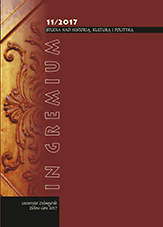Abstract
ELEMENTS Of CYNIC PHILOSOPHY IN PRIMARY EDUCATION DURING THE ERA Of THe LATE ROMAN EMPIRE
Ancient Cynicism was a philosophy practiced up to the 4th century A.D. Among the key sources that describe the activities of Cynics during this period are two speeches by the Roman emperor, Julian (361-363). Within these two speeches he criticized the contemporary supporters of Cynicism. Julian had extensive knowledge about the rules of Cynicism and about the lives of its founders: Antisthenes, Diogenes of Sinope, and Crates of Thebes. He possibly acquired this knowledge during his philosophical studies. It is possible, however, that the future emperor came into contact with cynicism much earlier, during a period of his primary education in Nicomedia between 338 and 342. Elements of Cynicism, especially the figure of the famous Diogenes the Dog, were presented at the Greek-speaking school in reading and writing courses. It was so because of the widespread popularity of Greek chreia in which the Sinopean philosopher was a main character. The chreiae with Diogenes as the main figure were also used in higher levels of education, including the schools of rhetoric. Such popularity of Cynic chreia in primary education is confirmed by the texts used in the classroom, preserved among the papyri, and in the handbooks of rhetorical art. We can’t exclude that in some cases young students chose a Cynic lifestyle under the influence of the philosophy of Cynicism and the legend of Diogenes, which he learned about during his primary education.
References
Apoftegmaty Ojców Pustyni, t. I: Gerontikon – Księga starców, pol. przekł. M. Borkowska, Kraków 2004.
Chreje
The Chreia and Ancient Rhetoric, vol. II, red. R.F. Hock, E.N. O’Neil, Leiden 2002.
The Chreia and Ancient Rhetoric, vol. I: The Progymnasmata, red. R.F. Hock, E.N. O’Neil, Atlanta 1986.
Diogenes Laertios
Diogenes Laertius, Lives of eminent philosophers, vol. II, red. R.D. Hicks, London-New York 1925.
Diomedes
Ars grammatica, [w:] The Chreia and Ancient Rhetoric, vol. II, red. R.F. Hock, E.N. O’Neil, Leiden 2002, s. 67-73.
Eunapiusz z Sardes
Philostratus and Eunapius, Lives of the Sophists, red. W.C. Wright, London-New York 1922.
Focjusz
Focjusz, Biblioteka, t. II, pol. przekł. O. Jurewicz, Warszawa 1988. Photius, Bibliotheca, t. II, red. i fr. przekł. R. Henry, Paris 1960.
Herodot z Halikarnasu Homer
Herodoti Historiae, t. I, red. K. Hude, Oxford 1908.
Iliada, pol. przekł. K. Jeżewska, Wrocław-Warszawa-Kraków-Gdańsk-Łódź 1981.
Inskrypcje
Supplementum Epigraphicum Graecum 26, Alphenann den Rijn-Germantown, MD 1979.
Jan Doksopatros
John Doxopatres, Homiliae 2, [w:] The Chreia and Ancient Rhetoric, vol. II, red. R.F. Hock, E.N. O’Neil, Leiden 2002, s. 74-77.
Jan Stobajos
Joannis Stobaei, Anthologium, vol. III, red. O. Hense, Berlin 1894.
Jan z Sardes
John of Sardis, Commentarium in Aphthonii, [w:] The Chreia and Ancient Rhetoric, vol. II, red. R.F. Hock, E.N. O’Neil, Leiden 2002, s. 98-112.
Julian cesarz rzymski
Julian Apostata, Misopogon, czyli nieprzyjaciel brody, red. i pol. przekł. A. Pająkowska, Wrocław 2009.
Julien L’Empereur, Oeuvres complètes, t. II, p. 1, red. G. Rochefort, Paris 1963.
Libaniusz
Libanii Opera, vol. II, red. R. Föster, Leipzig 1904.
Libanii Opera, vol. VIII, red. R. Föster, Leipzig 1915.
Libanius, Progymnasmata 3, [w:] The Chreia and Ancient Rhetoric, vol. II, red. R.F. Hock, E.N. O’Neil, Leiden 2002, s. 113-210.
Opracowania
Athanassiadi P., Julian and Hellenism – An Intelectual Biography, London-New York 1992.
Bouffartigue J., Le cynisme dans le cursus philosophique au IVe siècle, [w:] Le cynisme ancient ses prolongements: Actes du colloque international du CNRS, Paris 22-25 juillet 1991, dir. M.-O. Goulet-Cazé, R. Goulet, Paris 1993, s. 339, 358.
Branham R.B., Diogenes Rhetoric and the Invention of the Cynicism, [w:] Le cynisme ancient et ses prolongements: Actes du colloque international du CNRS, Paris 22-25 juillet 1991, dir. M.-O. Goulet-Cazé, R. Goulet, Paris 1993, s. 445-473.
Dictionnaire des philosophes antiques, t. III, dir. R. Goulet, Paris 2000.
Downing F.G., Cynics and Christian Origins, Edinburgh 1992.
Fischer H.A., Studies in Cynicism and the Ancient Near East: the Transformation of a „Chria”, [w:] Religions in Antiquity. Essays in Memory of Erwin Ramsdell Goodenough, red. J. Neusner, Leiden 1970, s. 372-411.
Frings I., Der Weise und der König: Solon und Kroisos bei Herodot und Lukian, Toruń 1996.
Hock R.F., Cynics and Rhetoric, [w:] Handbook of Classical Rhetoric in the Hellenistic Period 330 B.C. – 400 A.D., red. S.E. Porter, Leiden 1997, s. 755, 775.
Höistad R., Cynic Hero and Cynic King: Studies in the Cynic Conception of Man, Uppsala 1948.
Kaster R.A., Guardians of Language: The Grammarian and Society in Late Antiquity, Berkeley-Los Angeles-London 1988.
Kojève A., Julian Apostata 331/332-363, [w:] Historia filozofii politycznej, cz. 2, red. P. Nowak, Warszawa 2016, s. 138-154.
Krueger D., Diogenes the Cynic among the Fourth Century Fathers, „Vigilae Christinae” 1993, vol. 47, s. 29-49.
Moles J., The Woman and the River: Diogenes’ Apophthegm from Herculaneum and Some Popular Misconceptions about Cynicism, „Aperion” 1983, vol. 17, s. 125, 130.
Morgan T.J., Literate education in the Hellenistic and Roman worlds, Cambridge 1998.
Olszaniec S., Krąg uczniów Aidesiosa. Przyczynek do problematyki środowisk neoplatońskich w 2 połowie IV wieku, „AUNC – Historia” 1999, nr 31, s. 157, 171.
Sinko T., Wielowiekowa popularność Diogenesa „Psa”, „Meander” 1960, t. 15, nr 2, s. 86-99.
Sofiści i retorzy greccy w cesarstwie rzymskim (I-VII w.), oprac. P. Janiszewski, K. Stebnicka, E. Szabat, Warszawa 2011.
Szabat E., Teachers in the Eastern Roman Empire (Fifth-Seven Centuries). A Historical Study and Prosopography, [w:] Alexandria: Auditoria of Kom El-dikka and Late Antique Education, Journal of Juristic Papyrology Supplement 8, Warszawa 2007, s. 177-345.
Szabat E., Wprowadzenie do badań nad edukacją u schyłku starożytności (V-VII w.), „U Schyłku Starożytności: Studia Źródłoznawcze” 2007, t. 6, s. 110-171.
Winiarczyk M., Problem autorstwa dzieł Diogenesa z Synopy, „Meander” 2004, nr 5-6, s. 337-347.

